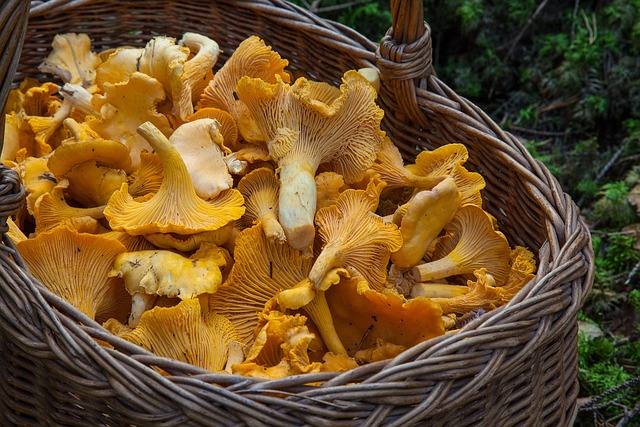Mushroom-Coffee for Cognitive Function: Unlocking the Power of Fungi
As we navigate the complexities of modern life, our minds are constantly seeking ways to improve focus, creativity, and mental clarity. In recent years, a unique fusion of two ancient practices – mushroom-based nutrition and coffee culture – has emerged as a promising solution: mushroom-coffee for cognitive function. This innovative blend combines the natural intelligence-boosting properties of fungi with the stimulating effects of coffee, offering a groundbreaking approach to enhancing our mental faculties.
Understanding Mushroom-Coffee for Cognitive Function
Mushroom-coffee for cognitive function is an emerging field that leverages the bioactive compounds found in various mushroom species to enhance cognitive performance. The core components include:
- Mushroom-based extracts: Fungi like Lion’s Mane, Reishi, and Cordyceps have been traditionally used for centuries to promote mental clarity and focus.
- Coffee: Arabica and Robusta coffee beans provide a natural source of caffeine, which amplifies the cognitive benefits of mushroom extracts.
Historical context:
- Ancient cultures, such as the Mayans and Aztecs, consumed mushrooms like Psilocybin-containing species for spiritual and intellectual growth.
- Modern research has confirmed the neuroprotective and cognitive-enhancing effects of certain fungi, leading to the development of mushroom-based supplements.
Global Impact and Trends
The global market for mushroom-coffee blends is rapidly expanding, driven by:
- Growing demand for natural products: Consumers seek alternatives to traditional energy drinks and coffee products that align with their wellness-oriented lifestyles.
- Increased interest in cognitive health: As awareness of neuroplasticity and the importance of mental well-being grows, people are looking for innovative solutions to boost focus, creativity, and productivity.
Regional trends:
- Asia-Pacific: Markets like Japan and South Korea have long been familiar with mushroom-based products, paving the way for the adoption of mushroom-coffee blends.
- North America: The United States is witnessing significant growth in the demand for natural energy-boosting products, driving the popularity of mushroom-coffee blends.
Economic Considerations
Market dynamics:
- Increasing competition: As more companies enter the market, competition is driving innovation and product diversification.
- Growth opportunities: Emerging markets like Latin America and Eastern Europe present untapped potential for mushroom-coffee blends.
Investment patterns:
- Private equity and venture capital: Investors are attracted to the growth prospects of mushroom-coffee blends, leading to increased funding in the sector.
- Government support: Governments are recognizing the economic benefits of promoting sustainable agriculture and local food systems, creating opportunities for mushroom-coffee businesses.
Technological Advancements
Significant technological advancements:
- Sustainable cultivation methods: Advances in vertical farming, biotechnology, and precision agriculture enable the large-scale production of high-quality mushrooms.
- Advanced extraction techniques: Novel processing methods facilitate the efficient extraction of bioactive compounds from fungi, ensuring consistent product quality.
Impact:
- Improved supply chain management: Technology streamlines production, reducing costs and increasing efficiency.
- Enhanced product development: Researchers can design new products with specific cognitive benefits in mind, catering to diverse consumer preferences.
Policy and Regulation
Key policies and regulations:
- Food safety standards: Compliance with international food safety guidelines ensures the quality and purity of mushroom-coffee blends.
- Labeling requirements: Clear labeling of ingredients and nutritional information empowers consumers to make informed decisions.
Influence on development:
- Regulatory frameworks: Countries are establishing their own regulatory environments, influencing market growth and investment patterns.
- Certification programs: Industry-led certification schemes promote best practices in production, processing, and distribution.
Challenges and Criticisms
Main challenges:
- Scalability: Meeting growing demand for mushroom-coffee blends requires significant investments in infrastructure and logistics.
- Consistency: Ensuring consistent product quality across different production batches and geographic regions is crucial.
Criticisms:
- Lack of standardization: The absence of standardized testing methods and regulations hinders the development of a robust industry.
- Consumer education: Many consumers lack understanding about mushroom-coffee blends, requiring targeted marketing and education campaigns.
Case Studies
Successful applications:
- Brain Bean: A start-up offering a range of mushroom-based coffee blends with unique cognitive benefits has seen significant growth in the North American market.
- Fungi & Co.: A UK-based company has developed a line of mushroom-coffee products, focusing on sustainable sourcing and eco-friendly packaging.
Lessons learned:
- Diversification: Companies that offer a range of products and flavors have seen increased success in capturing market share.
- Education and awareness: Effective marketing campaigns highlighting the benefits and unique characteristics of mushroom-coffee blends drive consumer engagement and loyalty.
Future Prospects
Growth areas:
- Functional foods: The demand for functional foods with specific health benefits is expected to continue driving growth in the mushroom-coffee industry.
- Wellness-oriented products: Consumers seeking natural solutions for mental well-being will fuel the adoption of mushroom-coffee blends.
Emerging trends:
- Personalized nutrition: The rise of personalized nutrition and wellness will lead to increased demand for customized mushroom-coffee blends tailored to individual needs.
- Sustainable packaging: As consumers prioritize environmental sustainability, companies that adopt eco-friendly packaging will gain a competitive edge.
Conclusion
Mushroom-coffee for cognitive function has emerged as a groundbreaking approach to enhancing mental performance. By understanding the historical context, global trends, and economic considerations, we can unlock the full potential of this innovative industry. Addressing challenges and criticisms through education, awareness, and standardization will pave the way for continued growth and success.
FAQ Section
Q: What are the cognitive benefits of mushroom-coffee blends?
A: Mushroom-based extracts like Lion’s Mane promote focus, creativity, and mental clarity, while coffee amplifies these effects.
Q: Are mushroom-coffee blends safe to consume?
A: Yes, when produced using high-quality ingredients and following proper manufacturing processes, mushroom-coffee blends are safe for consumption.
Q: Can I grow my own mushrooms for coffee blends?
A: While possible, large-scale commercial production requires specialized equipment and expertise.

Mushroom Coffee: Boosting Cognitive Health Naturally
Mushroom coffee, incorporating adaptogenic mushrooms like Lion's Mane, Cordyceps, and Reishi, i…….
Read More
Mushroom Coffee and Cognitive Clarity: Harnessing Nature’s Focus Enhancers
Mushroom coffee is a health-forward beverage that combines traditional coffee with the cognitive-bo…….
Read More
Mindful Mornings Awake: Savoring Mushroom Coffee for Enhanced Cognitive Function
2023 saw a surge in popularity for mushroom coffee, a beverage that combines traditional coffee with…….
Read More
Mushroom Coffee: Enhancing Focus and Fostering Calm for Optimal Mindfulness
Mushroom coffee, a fusion of traditional coffee with adaptogenic fungi like Cordyceps, Lion's …….
Read More
Mushroom Coffee: Fueling Focus and Brain Health
Mushroom coffee, enriched with adaptogenic mushrooms like lion's mane and cordyceps, is a risi…….
Read More
Mushroom Coffee: Awakening Cognitive Power for Stronger Mornings
Mushroom coffee, infused with adaptogenic fungi such as Cordyceps, Lion's Mane, and Reishi, ha…….
Read More